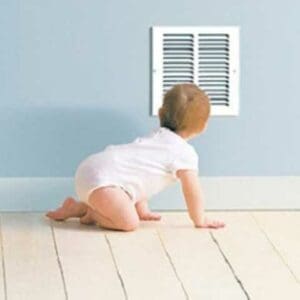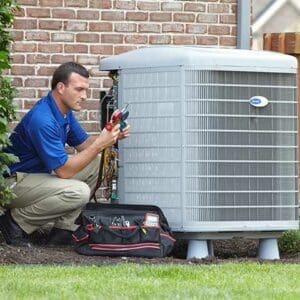Improving Indoor Air Quality in Tucson
In the arid city of Tucson, where the sun shines relentlessly, and the dust seems to dance in every beam, the battle for fresh, clean air rages on – and it’s a battle that starts at home. Our indoor spaces, where we spend the bulk of our time, can sometimes be more polluted than the busy streets of downtown Tucson, threatening our well-being in often imperceptible ways. This article explores the critical steps you can take to improve indoor air quality in Tucson, whether it’s your home or any other indoor environment.
The Air We Don’t Always See
 Understanding IAQ is the first step in shielding your home against poor air quality. Indoor air can be tainted by various pollutants, from volatile organic compounds (VOCs) released by cleaning products and furnishings, to the more familiar dust and pollen.
Understanding IAQ is the first step in shielding your home against poor air quality. Indoor air can be tainted by various pollutants, from volatile organic compounds (VOCs) released by cleaning products and furnishings, to the more familiar dust and pollen.
In Tucson, with its unique blend of desert conditions and urban environments, specific concerns arise, including particulate matter stirred up by the dry, windy weather and allergens such as the pollen of Arizona Cypress and White Mountain Cedar.
These pollutants aren’t just irritants; they can trigger or worsen a host of health issues, from allergies and asthma to more serious respiratory conditions. It’s a direct assault on the one place we should feel safe and rejuvenated – our homes.
Recognizing the Red Flags
While many pollutants are invisible, their effects may manifest in noticeable symptoms. Regular sniffling, sneezing, or a persistent cough are common signs of poor IAQ, as are unexplained headaches and fatigue. In severe cases or with prolonged exposure, indoor air pollution can lead to dizziness, nausea, or even long-term health problems.
Mold, another common concern in Tucson due to high humidity levels during monsoon season, can also be an IAQ disruptor. Its presence might not always be obvious, but clues like musty odors and unexplained staining on walls or ceilings can be telltale signs that your air quality is under siege.
Ways to Improve Indoor Air Quality in Tucson 101
Thankfully, there are practical measures you can take to bolster the air quality within your Tucson home. Start by looking at the basics:
- Regular cleaning: Clean regularly, using vacuum cleaners equipped with HEPA filters to trap smaller particles. Be vigilant about moisture control to thwart mold growth, especially during Tucson’s monsoon season.
- Proper ventilation: Ensuring adequate ventilation in your home is crucial. This allows pollutants to escape and fresh air to enter. Even opening windows for a few minutes on cooler days can make a difference.
- HVAC filter adoption: Invest in air filters for your HVAC system and change them regularly. Not just any filters, though – aim for high-efficiency models that can catch the finer particles. Proactive maintenance of your air conditioning system is also key to preserving healthy IAQ. Remember, your HVAC system doesn’t just regulate temperature; it’s a vital player in air filtration and moisture control too.
- Smart renovations: When considering improvements or renovations, always keep IAQ in mind, selecting materials and designs that will enhance, not detract from, the air you breathe.
Allies in the Fight for Cleaner Air
Air purifiers and indoor plants are the humble heroes that can help your efforts to squash pollutants. Portable air purifiers with HEPA filters can be a powerful addition to bedrooms or living areas, especially in highly trafficked or pet-friendly areas.
NASA’s Clean Air Study found that certain indoor plants can also act as natural air purifiers, their leaves and roots acting like sponges for toxins in the air.
In homes where allergies and asthma are a concern, implementing allergen-reducing bedding and using green cleaning products can minimize the introduction of new pollutants. Additionally, regular airing out of dry-cleaned clothing before storing it inside can prevent the off-gassing of potentially harmful chemicals.
The Crucial Maintenance Call
 An often overlooked but crucial aspect of IAQ defense is the maintenance of your HVAC system. An annual inspection by a qualified technician can identify and address issues before they impact air quality. Duct cleaning should be part of the inspection, particularly for homes where excessive dust or debris is a recurring issue.
An often overlooked but crucial aspect of IAQ defense is the maintenance of your HVAC system. An annual inspection by a qualified technician can identify and address issues before they impact air quality. Duct cleaning should be part of the inspection, particularly for homes where excessive dust or debris is a recurring issue.
An in-depth HVAC service will cover not just the mechanical components but also the health of the system’s various parts, ensuring that it continues to provide clean, properly conditioned air throughout your home. Remember, an ounce of prevention is worth a pound of cure, especially when it comes to the air you breathe.
The Ongoing Journey to Improve Indoor Air Quality in Tucson
Our homes should be sanctuaries, but if the air within them is laden with pollutants, they can become unwitting sources of health risks. Improving indoor air quality in Tucson, where the outdoors provides its share of respiratory challenges, is a continuous process, not a one-time event. Regular checks and proactive measures form layers of protection that keep your home healthy year-round.
By consistently practicing good IAQ habits, you can lead to a marked difference in your home environment, with benefits that extend to the whole family. Cleaner air means fewer sick days, better sleep, and a generally improved quality of life – a breath of fresh air, indeed.
Remember, every breath counts. Prioritize your IAQ today for a healthier tomorrow – one lungful at a time.

